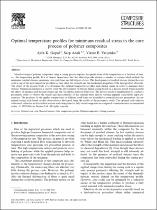 ResearchSpace
ResearchSpace
Optimal temperature profiles for minimum residual stress in the cure process of polymer composites
JavaScript is disabled for your browser. Some features of this site may not work without it.
- ResearchSpace
- →
- Research Publications/Outputs
- →
- Journal Articles
- →
- View Item
| dc.contributor.author |
Gopal, Ajith K

|
en_US |
| dc.contributor.author |
Adali, S

|
en_US |
| dc.contributor.author |
Verijenko, VE

|
en_US |
| dc.date.accessioned | 2007-01-20T12:44:27Z | en_US |
| dc.date.accessioned | 2007-06-07T10:05:46Z | |
| dc.date.available | 2007-01-20T12:44:27Z | en_US |
| dc.date.available | 2007-06-07T10:05:46Z | |
| dc.date.issued | 2000-01 | en_US |
| dc.identifier.citation | Gopal, AK, Adali, S and Verijenko, VE. 2000. Optimal temperature profiles for minimum residual stress in the cure process of polymer composites. Composite Structures, vol. 48, 03 January, pp 99-106 | en_US |
| dc.identifier.issn | 0263-8223 | en_US |
| dc.identifier.uri | http://hdl.handle.net/10204/1432 | en_US |
| dc.identifier.uri | http://hdl.handle.net/10204/1432 | |
| dc.description.abstract | Manufacturing of polymer composites using a curing process requires the specification of the temperature as a function of time, i.e., the temperature profile. It is of utmost importance that the selected profile satisfies a number of criteria which include the minimum residual stresses, minimum cure cycle lime and full degree of cure. The development of residual stresses during the cure cycle is one of the most important problems as they affect the strength and the mechanical properties of the final product adversely. The object of the present study is to determine the optimal temperature profiles used during curing in order to minimise these stresses. Numerical simulation is used to study the development of stresses during curing based on a process model which includes the effects of chemical and thermal strains and the viscoelastic material behaviour. The process model is implemented to conduct a parametric study to observe the trends and characteristics of the residual stress history varying engineer controllable input parameters. The gradients of the applied temperatures at different dwell times are identified as essential process parameters. An optimised curing cycle based on this observation is developed using the results of the parametric study. The optimal cycle achieves substantial reduction in the residual stresses and curing time for fully cured composites as compared to manufacturer recommended cycles. | en_US |
| dc.format.extent | 209054 bytes | en_US |
| dc.format.mimetype | application/pdf | en_US |
| dc.language.iso | en | en_US |
| dc.publisher | Elsevier Science LTD | en_US |
| dc.rights | Copyright: 2000 Elsevier Science LTD | en_US |
| dc.subject | Residual stresses | en_US |
| dc.subject | Optimal cure cycles | en_US |
| dc.subject | Cure temperature profiles | en_US |
| dc.subject | Polymer composites | en_US |
| dc.subject | Materials sciences | en_US |
| dc.title | Optimal temperature profiles for minimum residual stress in the cure process of polymer composites | en_US |
| dc.type | Article | en_US |
| dc.identifier.apacitation | Gopal, A. K., Adali, S., & Verijenko, V. (2000). Optimal temperature profiles for minimum residual stress in the cure process of polymer composites. http://hdl.handle.net/10204/1432 | en_ZA |
| dc.identifier.chicagocitation | Gopal, Ajith K, S Adali, and VE Verijenko "Optimal temperature profiles for minimum residual stress in the cure process of polymer composites." (2000) http://hdl.handle.net/10204/1432 | en_ZA |
| dc.identifier.vancouvercitation | Gopal AK, Adali S, Verijenko V. Optimal temperature profiles for minimum residual stress in the cure process of polymer composites. 2000; http://hdl.handle.net/10204/1432. | en_ZA |
| dc.identifier.ris | TY - Article AU - Gopal, Ajith K AU - Adali, S AU - Verijenko, VE AB - Manufacturing of polymer composites using a curing process requires the specification of the temperature as a function of time, i.e., the temperature profile. It is of utmost importance that the selected profile satisfies a number of criteria which include the minimum residual stresses, minimum cure cycle lime and full degree of cure. The development of residual stresses during the cure cycle is one of the most important problems as they affect the strength and the mechanical properties of the final product adversely. The object of the present study is to determine the optimal temperature profiles used during curing in order to minimise these stresses. Numerical simulation is used to study the development of stresses during curing based on a process model which includes the effects of chemical and thermal strains and the viscoelastic material behaviour. The process model is implemented to conduct a parametric study to observe the trends and characteristics of the residual stress history varying engineer controllable input parameters. The gradients of the applied temperatures at different dwell times are identified as essential process parameters. An optimised curing cycle based on this observation is developed using the results of the parametric study. The optimal cycle achieves substantial reduction in the residual stresses and curing time for fully cured composites as compared to manufacturer recommended cycles. DA - 2000-01 DB - ResearchSpace DP - CSIR KW - Residual stresses KW - Optimal cure cycles KW - Cure temperature profiles KW - Polymer composites KW - Materials sciences LK - https://researchspace.csir.co.za PY - 2000 SM - 0263-8223 T1 - Optimal temperature profiles for minimum residual stress in the cure process of polymer composites TI - Optimal temperature profiles for minimum residual stress in the cure process of polymer composites UR - http://hdl.handle.net/10204/1432 ER - | en_ZA |





